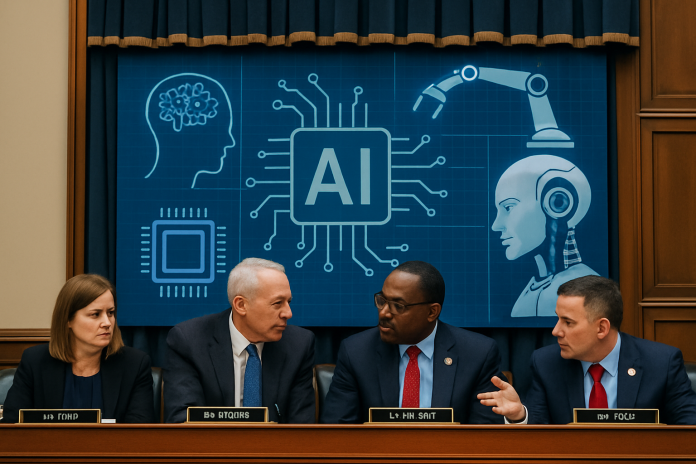Quick Take
- Congressional subcommittee examines AI regulation across financial institutions in September 2025 hearing
- Trump Administration’s Executive Order 14179 removes barriers to American AI leadership
- Lawmakers cite rising AI-facilitated misinformation from foreign entities as key concern
- Financial institutions face pressure to deploy advanced AI defenses against fraud
- Strategic competition with China drives urgency for comprehensive AI policy framework
Congress Tackles AI Regulation as Strategic Priority
House subcommittee hearing reveals bipartisan push for comprehensive framework | September 2025
Congress is moving closer to establishing comprehensive artificial intelligence regulations, as lawmakers dig into both the promise and perils during a pivotal House Subcommittee on Digital Assets, Financial Technology, and Artificial Intelligence hearing this September.
The session showed growing agreement across party lines that AI rules need to encourage innovation while addressing security risks – especially as the US faces intensifying competition from China.
Policy Shift Removes AI Development Barriers
The Trump Administration’s Executive Order 14179 marks a significant change in how government approaches AI strategy, specifically targeting regulatory roadblocks that previously held back American AI leadership.
Subcommittee Chair Bryan Steil stressed that this new approach creates a “try-first regulatory environment” meant to speed up AI progress across various sectors, stepping away from the restrictive policies of earlier administrations.
Chairman French Hill pointed to AI’s game-changing potential in financial services, highlighting major benefits from better fraud detection to stronger anti-money laundering systems that could transform how institutions operate.
Misinformation Emerges as Critical Challenge
Lawmakers voiced serious concerns about AI’s role in spreading false information, with Rep. Zach Nunn pointing to specific cases where foreign actors used AI tools to push misinformation through government channels.
This double-edged nature of AI technology creates tough challenges for regulators trying to build frameworks that encourage good uses while stopping bad actors from exploiting the technology.
Global Competition Drives Strategic Urgency
Rep. Bill Huizenga emphasized how crucial it is for America to stay ahead in AI development, especially given China’s aggressive push into artificial intelligence.
The competitive pressure has lawmakers rushing to make sure regulatory frameworks help rather than hurt domestic AI innovation while keeping necessary security protections in place.
Dr. Christian Lau from Dynamo AI testified about keeping markets open and competitive to maintain strategic advantages over global rivals in the fast-moving AI space.
Financial Sector Strengthens AI Defense Capabilities
Rep. John Rose focused on the financial industry’s urgent need to beef up defenses against AI-powered fraud, pushing for both large and small institutions to get access to cutting-edge technology.
The hearing showed that financial institutions are caught in an escalating digital arms race, needing constant technology updates to stay ahead of increasingly smart AI-powered threats.
Industry Leaders Outline Implementation Strategies
Dr. David Cox of IBM testified about the vital importance of building security into every step of AI development, rather than adding it as an afterthought.
Daniel Gorfine from Gattaca Horizons highlighted AI’s power to improve decision-making and enhance customer experiences across different financial services.
Industry witnesses agreed that successful AI implementation needs coordinated work between regulators, tech companies, and financial institutions to create effective oversight frameworks.
Strategic Framework for American AI Leadership
The congressional hearing is part of a bigger strategic push to make the United States the global leader in responsible AI development and use across critical sectors.
Lawmakers stressed that effective AI regulation must protect national security, promote innovation, and maintain competitive edges in the global technology race all at once.
The bipartisan support in these discussions suggests potential for comprehensive legislation that tackles both immediate regulatory needs and long-term strategic positioning in global AI competition.






